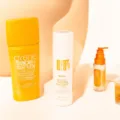Introduction to Plant-Based Sun Care Ingredients
In recent years, there has been a growing interest in natural and plant-based sun care products. As people become more aware of the potential harm caused by synthetic chemicals in traditional sunscreens, they are turning to natural alternatives for UV protection. This article explores the benefits of plant-based sun care ingredients and highlights some of the most effective natural compounds for protecting your skin from the sun’s harmful rays.
Why Choose Plant-Based Sun Care?
Plant-based sun care products offer several advantages over conventional sunscreens. Firstly, they are made from natural ingredients, which are less likely to cause skin irritation or allergic reactions. Secondly, these ingredients are often rich in antioxidants and other nutrients that can nourish and protect the skin. Additionally, plant-based sun care products are generally more environmentally friendly, as they do not contain harmful chemicals that can damage marine life and ecosystems.
Top Plant-Based Ingredients for UV Protection
Zinc Oxide
Zinc oxide is a mineral that provides broad-spectrum protection against both UVA and UVB rays. It is a popular ingredient in natural sunscreens because it is effective, safe, and gentle on the skin. Zinc oxide works by creating a physical barrier on the skin’s surface, reflecting and scattering UV radiation.
Red Raspberry Seed Oil
Red raspberry seed oil is rich in essential fatty acids and antioxidants, making it an excellent choice for natural sun protection. Studies have shown that it has a natural SPF of between 28 and 50, depending on the quality and concentration of the oil. Additionally, it helps to soothe and moisturize the skin, reducing inflammation and promoting healing.
Carrot Seed Oil
Carrot seed oil is another powerful plant-based ingredient with natural sun-blocking properties. It contains high levels of beta-carotene, vitamins A and E, and antioxidants that protect the skin from UV damage. Carrot seed oil also has antiseptic properties, which can help to prevent and treat skin infections.
Aloe Vera
Aloe vera is well-known for its soothing and healing properties, making it a popular ingredient in after-sun care products. It also offers some protection against UV radiation, thanks to its antioxidant content. Aloe vera can help to cool and hydrate the skin, reducing the risk of sunburn and promoting faster recovery from sun exposure.
Green Tea Extract
Green tea extract is packed with polyphenols, which are powerful antioxidants that protect the skin from UV damage. Studies have shown that applying green tea extract to the skin can reduce inflammation, prevent sunburn, and even lower the risk of skin cancer. It can be found in many natural sunscreens and sun care products.
How to Incorporate Plant-Based Sun Care into Your Routine
To get the most out of plant-based sun care ingredients, it is important to use them correctly. Here are some tips for incorporating these natural compounds into your daily skincare routine:
- Choose a natural sunscreen that contains one or more of the ingredients mentioned above.
- Apply the sunscreen generously and evenly to all exposed skin, at least 15 minutes before going outside.
- Reapply every two hours, or more often if you are swimming or sweating.
- Complement your sun care routine with protective clothing, hats, and sunglasses to further reduce UV exposure.
- Stay in the shade whenever possible, especially during peak sun hours from 10 AM to 4 PM.
FAQ
What is the best plant-based ingredient for sun protection?
While there are several effective plant-based ingredients for sun protection, zinc oxide is often considered the best due to its broad-spectrum UV protection and minimal risk of skin irritation.
Can I use plant-based sun care products on sensitive skin?
Yes, plant-based sun care products are generally suitable for sensitive skin. Natural ingredients like aloe vera and red raspberry seed oil are known for their soothing and anti-inflammatory properties.
How often should I reapply natural sunscreen?
Just like conventional sunscreens, natural sunscreens should be reapplied every two hours, or more frequently if you are swimming or sweating.
Are plant-based sun care products safe for children?
Plant-based sun care products are usually safe for children, but it is always best to check the product label for age recommendations and consult with a pediatrician if you have any concerns.
Do natural sunscreens provide enough protection for all skin types?
Natural sunscreens can provide adequate protection for all skin types, but it is important to choose a product with a high SPF rating and broad-spectrum protection to ensure maximum effectiveness.
Conclusion
Plant-based sun care ingredients offer a natural and effective way to protect your skin from the sun’s harmful rays. By incorporating these ingredients into your daily skincare routine, you can enjoy the benefits of UV protection while nourishing and caring for your skin. Remember to choose high-quality products, apply them correctly, and take additional precautions to minimize sun exposure for the best results.









